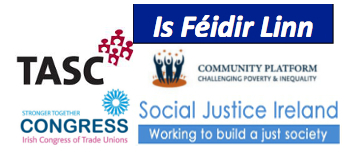We have choices.
Irish society is subject to a wide range of global, regional and national forces for change. These are not just economic but also include demographic, technological, and environmental forces. Ireland can only negotiate a way through these forces for change on the basis of a clear set of values that inform the type of society we want to be. We believe that values such as those of equality, inclusion, sustainability and human dignity offer a necessary compass for Ireland’s future and suggest very different approaches to addressing and managing these forces for change. The kind of policy choices that could reflect these values are set out below for discussion.
Creating the space for choice
We need to move from a reactive response to the present economic forces for change to a more proactive management of our collective future. We need to create the space to advance an alternative response to the economic recession. The various choices outlined below would be enabled by:
• Establishing values that include equality, inclusion and sustainability and human dignity as the criteria for making public policy decisions.
• A longer time-frame for adjustment of the public finances to the new economic reality.
• Mobilising available resources to stimulate a new approach to economic, environmental and social development.
• Effective regulation of employment relationships, business activity and the financial sector.
• Developing more robust measures of well being and progress that address economic, environmental and social benefits and costs in a more integrated way.
Making different choices
The goal of a more equal, inclusive and sustainable Ireland has practical implications for economic, environmental, social and cultural policy and budgetary decisions. This goal directs us to:
2.Making the Economy work for the People
Right now Ireland faces serious challenges and choices and people need hope that their future will be more secure. This session asks what sort of transformative policies should guide Ireland into the medium term
2a Economy and environment
• Change the current development model and define and measure progress in a balanced way that stresses economic security and social and environmental sustainability.
• Ensure that natural resources are developed sustainably and benefit the common good over private profit.
• Drive a strong indigenous economy through links with appropriate Foreign Direct Investment, state-owned enterprises and investing in specific local enterprise strategies.
• Regulate banking to change the culture from one of speculative banking to one where currently state-owned banks and new local banking models focus on guaranteeing credit to local enterprises and communities.
• Prioritise a legally binding national sustainable development strategy that caps resource use, reduces greenhouse gas emissions and implements measures to protect our life support systems.
2b Income, Wealth and Work
• Prioritise high levels of decent employment with a stimulus package to maximize job creation in a green/social economy.
• Utilise the ‘pension reserve fund’ to invest in capital works programmes of social infrastructure and in private and social enterprise small business start ups.
• Increase the overall tax take to the EU average and broaden the tax base.
• Recognise and reward all meaningful work, enable more flexible work arrangements and greater job sharing, and care work to be shared more equally between men and women.
• Achieve greater income equality and reduce poverty through wage, tax and income policies that support maximum and minimum income thresholds.
3. Reforming the State to work for the People
Right now Ireland faces serious challenges and choices and people need hope that their future will be more secure. This session asks what sort of transformative policies should guide Ireland into the medium term
3a Governance
• Reform representative political institutions to enhance accountability, equality, capacity, and efficiency of national and local decision makers.
• Develop participatory and deliberative forms of citizens’ engagement in public governance and enhance democratic participation by fostering the advocacy role of civil society organizations, civics and ethics education in all school levels and a diverse media.
• Develop a strong and effective judicial system that is proactive in protecting and advancing equality and human rights and that secures timely, effective and barrier free access to justice.
• Support wider and more diverse participation in decision making in institutions (e.g. collective bargaining, public service user consultation and student’s participation in decision making in educational institutions).
• Ensure Ireland’s global role, foreign and economic policies and international relations advances the rights of impoverished and exploited people in the countries of the global south.
3b Access to Services and Public Sector Renewal
• Make efficiency, integration, and equality the goals of public service reform.
• Provide universal access to quality healthcare, childcare and services for older people.
• Invest in equality in access to and participation in all levels of education (preschool to university).
• Enable people feel secure and safe by guaranteeing the right to housing, safe communities and a national public transport system.
• Empower people through a modern and individualised social welfare system, universal services and effective delivery of targeted resources.

